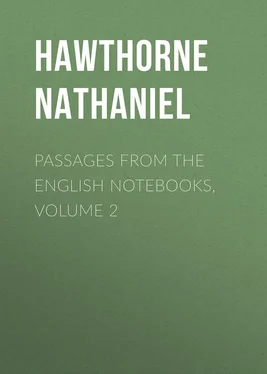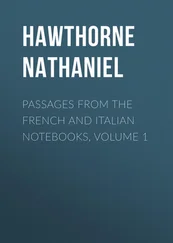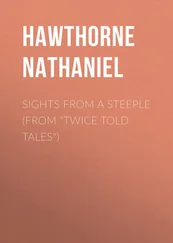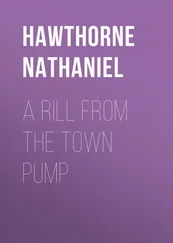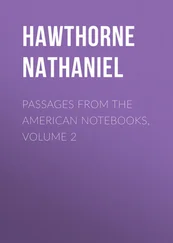Nathaniel Hawthorne - Passages from the English Notebooks, Volume 2
Здесь есть возможность читать онлайн «Nathaniel Hawthorne - Passages from the English Notebooks, Volume 2» — ознакомительный отрывок электронной книги совершенно бесплатно, а после прочтения отрывка купить полную версию. В некоторых случаях можно слушать аудио, скачать через торрент в формате fb2 и присутствует краткое содержание. Жанр: literature_19, foreign_antique, foreign_prose, на английском языке. Описание произведения, (предисловие) а так же отзывы посетителей доступны на портале библиотеки ЛибКат.
- Название:Passages from the English Notebooks, Volume 2
- Автор:
- Жанр:
- Год:неизвестен
- ISBN:нет данных
- Рейтинг книги:5 / 5. Голосов: 1
-
Избранное:Добавить в избранное
- Отзывы:
-
Ваша оценка:
- 100
- 1
- 2
- 3
- 4
- 5
Passages from the English Notebooks, Volume 2: краткое содержание, описание и аннотация
Предлагаем к чтению аннотацию, описание, краткое содержание или предисловие (зависит от того, что написал сам автор книги «Passages from the English Notebooks, Volume 2»). Если вы не нашли необходимую информацию о книге — напишите в комментариях, мы постараемся отыскать её.
Passages from the English Notebooks, Volume 2 — читать онлайн ознакомительный отрывок
Ниже представлен текст книги, разбитый по страницам. Система сохранения места последней прочитанной страницы, позволяет с удобством читать онлайн бесплатно книгу «Passages from the English Notebooks, Volume 2», без необходимости каждый раз заново искать на чём Вы остановились. Поставьте закладку, и сможете в любой момент перейти на страницу, на которой закончили чтение.
Интервал:
Закладка:
Nathaniel Hawthorne
Passages from the English Notebooks, Volume 2
LONDON. – MILTON-CLUB DINNER
April 4th, 1856. – On Tuesday I went to No. 14 Ludgate Hill, to dine with Bennoch at the Milton Club; a club recently founded for dissenters, nonconformists, and people whose ideas, religious or political, are not precisely in train with the establishment in church and state. I was shown into a large reading-room, well provided with periodicals and newspapers, and found two or three persons there; but Bennoch had not yet arrived. In a few moments, a tall gentleman with white hair came in, – a fine and intelligent-looking man, whom I guessed to be one of those who were to meet me. He walked about, glancing at the periodicals; and soon entered Mr. Tupper, and, without seeing me, exchanged warm greetings with the white-haired gentleman. "I suppose," began Mr. Tupper, "you have come to meet – " Now, conscious that my name was going to be spoken, and not knowing but the excellent Mr. Tupper might say something which he would not, quite like me to overhear, I advanced at once, with outstretched hand, and saluted him. He expressed great joy at the recognition, and immediately introduced me to Mr. Hall.
The dining-room was pretty large and lofty, and there were sixteen guests at table, most of them authors, or people connected with the press; so that the party represented a great deal of the working intellect of London at this present day and moment, – the men whose plays, whose songs, whose articles, are just now in vogue. Mr. Tom Taylor was one of the very few whose writings I had known anything about. He is a tall, slender, dark young man, not English-looking, and wearing colored spectacles, so that I should readily have taken him for an American literary man. I did not have much opportunity of talking with him, nor with anybody else, except Dr. – , who seemed a shrewd, sensible man, with a certain slight acerbity of thought. Mr. Herbert Ingram, recently elected member of Parliament, was likewise present, and sat on Bennoch's left.
It was a very good dinner, with an abundance of wine, which Bennoch sent round faster than was for the next day's comfort of his guests. It is singular that I should thus far have quite forgotten W – H – , whose books I know better than those of any other person there. He is a white-headed, stout, firm-looking, and rather wrinkled-faced old gentleman, whose temper, I should imagine, was not the very sweetest in the world. There is all abruptness, a kind of sub-acidity, if not bitterness, in his address; he seemed not to be, in short, so genial as I should have anticipated from his books.
As soon as the cloth was removed, Bennoch, without rising from his chair, made a speech in honor of his eminent and distinguished guest, which illustrious person happened to be sitting in the selfsame chair that I myself occupied. I have no recollection of what he said, nor of what I said in reply, but I remember that both of us were cheered and applauded much more than the occasion deserved. Then followed about fifty other speeches; for every single individual at table was called up (as Tupper said, "toasted and roasted"), and, for my part, I was done entirely brown (to continue T – 's figure). Everybody said something kind, not a word or idea of which can I find in my memory. Certainly, if I never get any more praise in my life, I have had enough of it for once. I made another little bit of a speech, too, in response to something that was said in reference to the present difficulties between England and America, and ended, as a proof that I deemed war impossible, with drinking success to the British army, and calling on Lieutenant Shaw, of the Aldershott Camp, to reply. I am afraid I must have said something very wrong, for the applause was vociferous, and I could hear the gentlemen whispering about the table, "Good!" "Good!" "Yes, he is a fine fellow," – and other such ill-earned praises; and I took shame to myself, and held my tongue (publicly) the rest of the evening. But in such cases something must be allowed to the excitement of the moment, and to the effect of kindness and goodwill, so broadly and warmly displayed; and even a sincere man must not be held to speak as if he were under oath.
We separated, in a blessed state of contentment with one another, at about eleven; and (lest I should starve before morning) I went with Mr. D – to take supper at his house in Park Lane. Mr. D – is a pale young gentleman, of American aspect, being a West-Indian by birth. He is one of the principal writers of editorials for the Times. We were accompanied in the carriage by another gentleman, Mr. M – , who is connected with the management of the same paper. He wrote the letters from Scutari, which drew so much attention to the state of the hospitals. Mr. D – is the husband of the former Miss – , the actress, and when we reached his house, we found that she had just come home from the theatre, and was taking off her stage-dress. Anon she came down to the drawing-room, – a seemingly good, simple, and intelligent lady, not at all pretty, and, I should think, older than her husband. She was very kind to me, and told me that she had read one of my books – The House of the Seven Gables – thirteen years ago; which I thought remarkable, because I did not write it till eight or nine years afterwards.
The principal talk during supper (which consisted of Welsh-rabbit and biscuits, with champagne and sodawater) was about the Times, and the two contributors expressed vast admiration of Mr. – , who has the chief editorial management of the paper. It is odd to find how little we outsiders know of men who really exercise a vast influence on affairs, for this Mr. – is certainly of far more importance in the world than a minister of state. He writes nothing himself; but the character of the Times seems to depend upon his intuitive, unerring judgment; and if ever he is absent from his post, even for a day or two, they say that the paper immediately shows it. In reply to my questions, they appeared to acknowledge that he was a man of expediency, but of a very high expediency, and that he gave the public the very best principles which it was capable of receiving. Perhaps it may be so: the Times's articles are certainly not written in so high a moral vein as might be wished; but what they lack in height they gain in breadth. Every sensible man in England finds his own best common-sense there; and, in effect, I think its influence is wholesome.
Apropos of public speaking, Dr. – said that Sir Lytton Bulwer asked him (I think the anecdote was personal to himself) whether he felt his heart beat when he was going to speak. "Yes." "Does your voice frighten you?" "Yes." "Do all your ideas forsake you?" "Yes." "Do you wish the floor to open and swallow you?" "Yes." "Why, then, you'll make an orator!" Dr. – told of Canning, too, how once, before rising to speak in the House of Commons, he bade his friend feel his pulse, which was throbbing terrifically. "I know I shall make one of my best speeches," said Canning, "because I'm in such an awful funk!" President Pierce, who has a great deal of oratorical power, is subject to a similar horror and reluctance.
REFORM-CLUB DINNER
April 5th. – On Thursday, at eight o'clock, I went to the Reform Club, to dine with Dr. – . The waiter admitted me into a great basement hall, with a tessellated or mosaic or somehow figured floor of stone, and lighted from a dome of lofty height. In a few minutes Dr. – appeared, and showed me about the edifice, which is very noble and of a substantial magnificence that was most satisfactory to behold, – no wood-work imitating better materials, but pillars and balustrades of marble, and everything what it purports to be. The reading-room is very large, and luxuriously comfortable, and contains an admirable library: there are rooms and conveniences for every possible purpose; and whatever material for enjoyment a bachelor may need, or ought to have, he can surely find it here, and on such reasonable terms that a small income will do as much for him as a far greater one on any other system.
Читать дальшеИнтервал:
Закладка:
Похожие книги на «Passages from the English Notebooks, Volume 2»
Представляем Вашему вниманию похожие книги на «Passages from the English Notebooks, Volume 2» списком для выбора. Мы отобрали схожую по названию и смыслу литературу в надежде предоставить читателям больше вариантов отыскать новые, интересные, ещё непрочитанные произведения.
Обсуждение, отзывы о книге «Passages from the English Notebooks, Volume 2» и просто собственные мнения читателей. Оставьте ваши комментарии, напишите, что Вы думаете о произведении, его смысле или главных героях. Укажите что конкретно понравилось, а что нет, и почему Вы так считаете.
